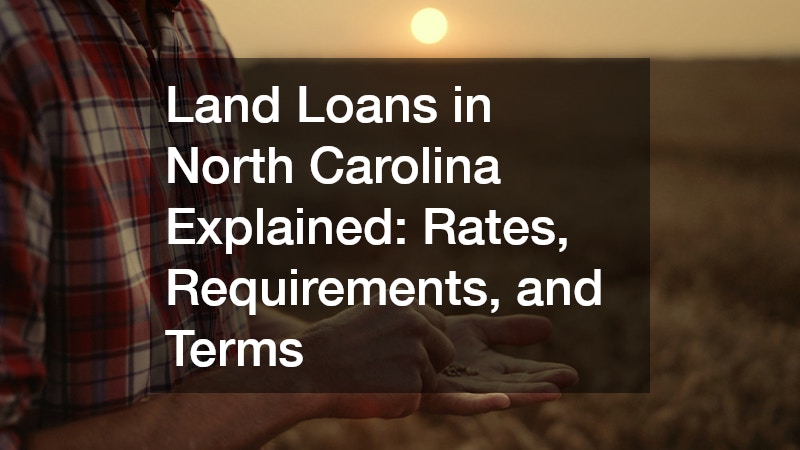When considering purchasing land in the Tar Heel State, understanding the intricacies of land loans is crucial. Whether it’s for building a dream home, establishing a farm, or making an investment, land loans offer a pathway to securing property. However, these loans differ significantly from traditional mortgage loans, necessitating a thorough exploration of their unique characteristics.
In North Carolina, land loans are essential for those looking to buy unimproved or vacant land. Unlike traditional home loans that are backed by standing structures, land loans entail greater risk for lenders.
As a result, they come with their own set of rates, requirements, and terms, all tailored to navigate the complexities of land acquisition.
This article delves deep into the world of land loans in North Carolina, providing insights into the prevailing rates, eligibility criteria, and key terms involved. For anyone eyeing a parcel in this diverse and scenic state, knowledge about land loans will provide the groundwork needed to embark on such a significant investment.
Understanding Land Loan Rates in North Carolina
Interest rates for land loans in North Carolina are influenced by several factors, including the borrower’s credit score, the loan term, and the land’s intended use. Generally, because land loans are riskier through the absence of collateral in the form of a completed structure, they come with higher interest rates than traditional mortgages.
Lenders might also evaluate the positives of owning land in a specific location, considering factors such as the development potential of the area and proximity to urban centers. Typically, rates can vary significantly based on whether the land is fully developed, partially developed, or raw land. Established improvement on the land can sometimes lead to more favorable rates.
Borrowers must shop around and compare various lenders in North Carolina, as interest rates may differ widely from one provider to another. Comparing quotes from banks, credit unions, and private lenders will help ensure that borrowers secure the best possible rates for their unique circumstances. Negotiation and a good credit standing can also be advantageous in this process, making it easier to manage the cost of borrowing.
Loan Requirements: Qualifying for a Land Loan
Qualifying for a land loan in North Carolina entails meeting specific requirements set by lenders. Primarily, a solid credit score is one of the main prerequisites, as lenders favor borrowers with proven creditworthiness. While exact score requirements can vary, a higher credit score typically results in better loan terms and lower interest rates.
In addition to credit scores, lenders may require a comprehensive financial profile, including income verification and information about existing debts. This information helps lenders assess an applicant’s ability to repay the loan. Moreover, some lenders may also request a detailed plan for the land, which involves what the borrower intends to do with it—such as residential development, agricultural use, or investment.
Another requirement common among lenders is a down payment, which can range from 20% to 50% of the land’s purchase price. This is higher than typical home loan requirements and reflects the increased risk lenders take on with land loans. Borrowers should be prepared to provide a substantial down payment to enhance their eligibility for loan approval.
Terms to Know: Navigating Land Loan Agreements
Understanding the terms associated with land loans is essential for anyone looking to engage in property acquisition in North Carolina. The loan term, or the duration over which the borrower agrees to repay the loan, varies depending on several factors, including the type of land and its intended use.
Typical loan terms for land loans can range from 5 to 15 years, although shorter or longer terms might be negotiated depending on the scenario. Additionally, borrowers should be attentive to terms regarding balloon payments, which are often common in land loans. A balloon payment involves repaying the bulk of the loan amount at the end of the term, making proper financial planning essential.
Other critical terms include loan-to-value (LTV) ratios, which measure the ratio of the loan amount to the appraised value of the property. Higher LTV ratios typically indicate a riskier loan, potentially leading to higher interest rates. Understanding these terms helps borrowers make informed decisions and prepare adequately for the financial commitments involved in a land loan agreement.
Land loans in North Carolina provide a valuable means for individuals to invest in property across the state. By understanding the rates, requirements, and terms associated with these loans, prospective buyers can make informed decisions aligned with their financial capabilities and property goals.
Though they present greater challenges than traditional home loans, diligent planning and research can mitigate these difficulties. With a strong credit score, a solid financial plan, and a clear vision for the land, securing a favorable loan becomes a more attainable goal.
Ultimately, the rewards of owning land in North Carolina are vast, offering opportunities for development and investment. By navigating the complexities of land loans effectively, potential buyers can embark on a fruitful journey towards land ownership in this diverse and vibrant state.



